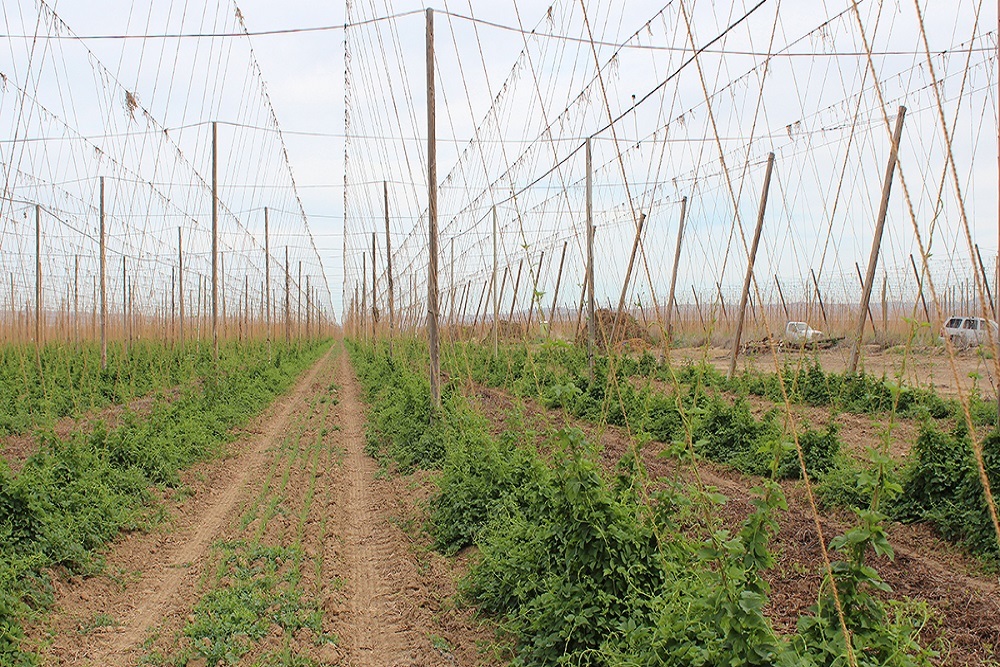University of Kansas recently issued the following announcement.
LAWRENCE — Like other farmers, U.S. hop farmers face pressure from environmental change and a global marketplace. And like farmers of commodity crops, hop farmers rely on technologies to collect data and make data-driven decisions. Unlike most other farmers, hop farmers pursue innovations themselves rather than relying on outside expertise.
The National Science Foundation’s Science and Technology Studies program awarded a $15,150 grant to Matt Comi’s project “Exploring on-farm innovation, environmental change, and rural livelihoods in the US hop industry.” A doctoral candidate in the University of Kansas Department of Sociology, Comi will explore how farmers persist — or not — in genuine decision-making about future iterations of their farms. Technology is a key part of how farmers shape their futures. It is also central to a nexus of pressures that farmers have faced since the 1980s: environmental change, biodiversity loss and rising costs.
“In contemporary data-driven agriculture, farmers are what I call ‘distributed,’ meaning that many actors participate in every farming decision,” Comi said. “Studying the ‘distributed farmer’ helps us see nuances about why corn and soy farmers don’t have a lot of agency and are economically and culturally ‘locked in’ particular farming techniques. These techniques often benefit non-farmers like agrochemical and seed production companies more than they benefit rural communities. Large hop farmers in the Yakima Valley have innovated their own on-farm technologies and techniques, and this shows us that these ‘distributed farmers’ are not always subject to being ‘locked in.’”
Hop farmers know well the consequences of fluctuating markets. They depend on beer producers to buy their product, and beer producers rely on a few farmers to supply this integral ingredient. A growing number of small beer producers demand larger quantities of expensive, and often proprietary, “aroma” hops grown and bred in the U.S. In Washington alone, around 40 growers make up the entirety of the state’s production of hops. That accounts for upward of 70% of the total annual U.S. hops production and about 35% of the world production.
Hops need certain conditions to thrive, so climate change could drastically affect the farmers who grow this crop. Agriculture is both a contributor to climate change and an industry under pressure from climate change. It is crucial for social science researchers explore how growing communities and local communities manage the effects of climate change.
Technology can help to mitigate these issues, but how technology is developed and used are politicized questions. Farmers answer those questions in cultural, environmental and economic contexts. In thinking about how farmers use technology, Comi researched how the goals for farmers who produce crops like hops vary from the goals for those who produce commodity crops like corn and soy.
In preliminary research, Comi has gathered evidence to help answer that question. Hop farmers, working a labor-intensive but lucrative product, developed innovations in genetics and infrastructure on their own farms. Some farmers even hire full-time engineers to develop technologies on-farm. The resulting custom-designed infrastructure and patented commercial varietals are proprietary. But farmers rather than agricultural corporations control these innovations.
“Understanding what innovations farmers pursue reveals exciting differences in the outcomes of applied plant science and agricultural engineering,” he said. “Put differently, this research explores whether farmers are able to innovate more environmentally and economically sustainable futures for themselves if they have the opportunity to conduct their own applied research.”
Comi will conduct over 30 farm visits and in-depth interviews with hop farmers over the course of the project. To do so, he will travel to Washington, Oregon, Idaho and Midwest farms stretching from Colorado to Michigan. He’ll also tour hop-growing operations and observe farmers at work. Paul Stock, associate professor of sociology and environmental studies, will supervise Comi’s work.
“Matt’s work illustrates that the future of agriculture and farmers’ lives is not guaranteed to end up in the dustbin. In fact, farmers, particularly hop farmers, may just have some of vital skills of innovation and creativity to stabilize not only their own financial futures but also create opportunities for their communities and other industries,” Stock said. “This is important and timely work.”
The Institute for Policy & Social Research assisted with proposal preparation and will manage the award. Comi also participated in IPSR’s Doctoral Research Fellows Program in 2018-19. This program offers graduate students across the social sciences training and support. Funding through that program supported some of his preliminary research.
The University of Kansas is a major comprehensive research and teaching university. The university's mission is to lift students and society by educating leaders, building healthy communities and making discoveries that change the world. The KU News Service is the central public relations office for the Lawrence campus.
kunews@ku.edu | 1450 Jayhawk Blvd., Suite 37, Lawrence, KS 66045

 Alerts Sign-up
Alerts Sign-up